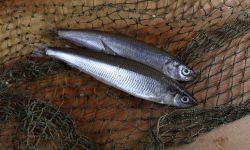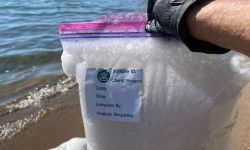Environment roundup: Michigan punts on PFAS testing at dairy farm


Bridge Magazine is committed to sharing the best environmental journalism in and around Michigan, an effort called #EnviroReads.
In Bridge’s Michigan Environment Watch, we share a roundup of recent stories on the Great Lakes or other environmental issues. If you see a story we should include next time, use the hashtag #EnviroReads on Twitter or email environmental reporter Jim Malewitz at jmalewitz@bridgemi.com.
Regulators Concerned Bottled Water, Not Just Tap, May Contain PFAS Contaminants
Consumer Reports
“Tap water contaminated with chemicals known as PFAS has become a major concern for some communities across the U.S. in recent years, with many turning to bottled water as an alternative source. But after tests last month showed that bottled spring water sold in several New England states had also been tainted by PFAS, questions are being raised about the safety of bottled water for those dealing with problems at their tap,” Ryan Felton reports. “The lack of required testing for PFAS in bottled water has been a particular concern for at least one state, Michigan, grappling with tap water contaminated by PFAS, according to documents recently obtained by Consumer Reports through a Freedom of Information Act request.”
Floods are changing in Michigan. We're building infrastructure like they're not.
Michigan Radio
“Climate change is likely to bring more extreme rainfall and flooding to Michigan. So, flood risk in the next 100 years will probably look very different than in the last. But, much of our infrastructure, like culverts, bridges, and storm drains, is still being designed and built based on the floods of the past,” Kaye LaFond reports.
Michigan is tiptoeing around PFAS in dairy agriculture
MLive
“Kay Fritz let the cattle out of the bag in Boston. Fritz, a toxicologist with the Michigan Department of Agriculture and Rural Development (MDARD), told the National PFAS Conference audience that Michigan punted on testing an Allegan County dairy farm because it worried about killing the farmer’s business. Testing found PFAS in the farm’s hay and pond water,” Garret Ellison reports. “Instead of testing milk from those cows, Fritz said that regulators, leery of repercussions seen in other states, decided the exposure wasn’t serious enough and ‘we weren’t going to go there’…The disclosure — ironically spoken June 12, which Gov. Gretchen Whitmer declared Michigan Dairy Foods Awareness Day this year — struck a discordant note and prompted a rebuke from an audience member, who noted that regulators were depriving consumers of the opportunity to avoid potentially contaminated products by not testing.”
DTE Energy rate hikes among biggest in country — as reliability still lags
Detroit Free Press
“In May, the Michigan Public Service Commission approved more than $273 million in rate hikes for DTE Energy, representing an 8.69% increase for average residential customers. Within two months, DTE had filed another request with the commission to raise rates even higher for 2020,” Keith Matheny reports. “If you feel like you've been here before, you have. From 2015 to this year, DTE Electric Co. has received $775 million in four rate increases — the second-biggest total rate hikes in the country. It's happening as the utility has come under fire for the frequency, and duration, of blackouts on its system.”
Scientists want to use the Samurai Wasp to fight Michigan's invasive stink bug problem
Fox 2
“After years of waging a losing war against an invasive stink bug, scientists believe they may have found a solution. It’s hairy, has two zany antennas, eyes half the size of its head and legs colored iridescent orange - it also flies,” Jack Nisson reports. “A natural predator of the invasive brown marmorated stink bug, its introduction represents a new stage in the fight against invasive species.”
Upper Peninsula mine approved despite major concerns from DEQ and EPA staff, records show
Detroit Free Press
“Over and over, Michigan environmental regulators sounded alarms as they reviewed a proposed large, open-pit ore mine in the Upper Peninsula near the Menominee River, prized for walleye fishing and a major tributary to Lake Michigan. The mine would send acidic mining wastes into the river and surrounding waterways, which would then spill into the Great Lake, staff said. More acres of wetlands would be harmed than the mining company was projecting, evaluators found,” Keith Matheny reports. “Then the U.S. Environmental Protection Agency and then-Michigan Department of Environmental Quality approved the mine anyway.”
Michigan Environment Watch
Michigan Environment Watch examines how public policy, industry, and other factors interact with the state’s trove of natural resources.
- See full coverage
- Subscribe
- Share tips and questions with Bridge environment reporter Kelly House
Michigan Environment Watch is made possible by generous financial support from:
Our generous Environment Watch underwriters encourage Bridge Michigan readers to also support civic journalism by becoming Bridge members. Please consider joining today.
See what new members are saying about why they donated to Bridge Michigan:
- “In order for this information to be accurate and unbiased it must be underwritten by its readers, not by special interests.” - Larry S.
- “Not many other media sources report on the topics Bridge does.” - Susan B.
- “Your journalism is outstanding and rare these days.” - Mark S.
If you want to ensure the future of nonpartisan, nonprofit Michigan journalism, please become a member today. You, too, will be asked why you donated and maybe we'll feature your quote next time!




